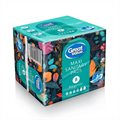There’s no better time to talk about menstrual hygiene, which is such an important aspect of women’s health.

Source: Supplied.
In light of issues such as period poverty and the pressing need to destigmatise menstrual health, a united and collective effort is needed to create spaces and places in which the women of South Africa can live and thrive.
Kotex, known for its hygiene products has always been at the forefront of promoting positive change. The brand has partnered with experts, thought leaders, South Africa’s Department of Basic Education, and some of the country’s most popular influencers to spread a message of hope, empowerment, and upliftment.
“This year, we want to emphasise the pride that women should feel in being their authentic selves. Despite being faced with many different hurdles, women continue to demonstrate their resilience and their innate sense of determination, even against the toughest of odds. Most recently we’ve seen shining examples of this in Olympic gold medalist, Tatjana Smith and Tyla who scooped the first-ever Grammy Award for Best African Music Performance.
"In these, as well as the stories of ordinary South African women who are the mothers, daughters, sisters, and partners of our beautiful nation, we draw immense inspiration. As a brand, we exist to serve all women, who – regardless of our many differences – share an unbreakable bond. Let’s hone in on the issues that matter – the issues that affect all women. Menstrual health, which is one of those issues, is at the top of our agenda,” says Caitlin Meredith, marketing manager at Kotex.
School-level intervention
Last year, Kotex kicked off its awareness drive with the Stay YOUnique School Programme, in collaboration with the Department of Basic Education. The initiative saw Kotex representatives donate premium sanitary products to a total of 250 schools and 75,000 Grade 6 and 7 learners throughout Gauteng.
Kotex also brought in medical professional and health advocate Nosipho Danielle Mhlanga, who visited participating schools to educate young girls. Her talks were key in dispelling myths about menstruation, addressing stigmas, sharing practical tips, and promoting better hygiene practices.
Since its inception, the Kotex Stay YOUnique School Programme has fostered open environments for engagement with parents, teachers, healthcare professionals, and community leaders around these important topics. Through this and its other initiatives, Kotex aims to champion change and equip young girls with the knowledge and tools they need to live happy, healthy, fulfilled lives.
Research key to awareness
The need for menstrual hygiene to be addressed without fear of judgment or discrimination was made clear by this year’s inaugural ‘P-Word’ Survey. The study gathered responses from women in informal settlements, rural areas, and urban low-, middle-, and high-income areas nationwide.
These women were asked several key questions related to their attitude towards their menstrual cycle, their personal experience with menstruation as well as their access to women’s hygiene products.
Its findings revealed that 60% of women experience the highest levels of discomfort and pain during their menstrual cycle, while 46% said menstruation affected their daily activities, such as work, school, and socialising.
A concerning 43% of respondents admitted to experiencing stigmatisation and shame attached to menstruation, which was more prevalent among those aged 18 and younger. Furthermore, just under 80% of survey respondents reported facing financial constraints when purchasing menstrual products.
These findings echo the sentiments of Mhlanga and the activists who joined Kotex and its industry peers in its 2018 efforts to lobby behind the cause of making sanitary pads more accessible by removing the accompanying Vat charge. The government proposal was successful, and sanitary pads have since been declared zero-rated or Vat-exempt.
This achievement marked the start of renewed efforts to raise menstrual health awareness, unite industry peers, eliminate barriers, and prioritise women's health in social consciousness, says Meredith.
From shame to self-worth
Another way in which women can optimise their health is through ‘cycle syncing’ or gaining an understanding of the four phases of their menstrual cycle, namely, the menstruation, follicular, ovulation, and luteal phases.
Feeling good during each of these phases can be achieved by tailoring your diet, exercise plan, self-care regime, and daily routine to your body’s unique needs. Research by Kotex revealed, however, that as much as 74% of women have never heard of cycle syncing.
To change this statistic, Kotex launched its Day 28 campaign, bringing together medical experts like Mhlanga and Riaad Moosa. On social media, dietician and entrepreneur, Minette Roth a.k.a. ‘The Livitition’ weighed in with dietary suggestions, and psychologist, Sanam Naran shared her guidance on understanding your emotional and mental needs during each phase of the cycle.
Leading influencer and businesswoman, Nadia Jaftha also joined the collective with her take on the four phases, adding a comedic spin to the campaign.
Efforts like these are “crucial to the ongoing encouragement and support of young girls and women to be the best versions of themselves, no matter ‘what time of the month’ it is.
"This Women’s Month, let’s unite behind this cause, share our experiences, break through the shame, and normalise menstrual health practices for the wellbeing of this generation and those to come,” says Mhlanga.































